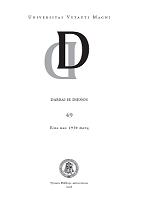SSRS REFORMŲ IŠVAKARĖSE NOMENKLATŪRA IR INTELIGENTIJA LIETUVOJE
USSR ON THE EVE OF REFORMS: NOMENKLATURA AND INTELLIGENTSIA IN LITHUANIAbu
Author(s): Rytis BulotaSubject(s): History
Published by: Vytauto Didžiojo Universitetas
Keywords: nomenklatūra; liberalizacija; inteligentija; elitas; nomenklatura; liberalization; intelligentsia; elite.
Summary/Abstract: Rapid and wide mass mobilizations characterized the fall of the Communist system in Europe. Mass movements based on nationalism played a major role in this break-up process. Liberalization in the USSR was the main political opportunity for the emergence of such pro-democratic national mass movements as Sąjūdis in Lithuania. This article provides an overview of the sociopolitical and economic situation which pushed M. Gorbachev to start reforms and liberalization in the USSR. At the same time, it must be said that Sąjūdis, and other movements of similar nature, were linked rather directly to the social groups which constituted the Soviet elite – the nomenklatūra and the intelligentsia, both discussed here for the purpose of demonstrating that by the end of the eighties of the last century the situation and the orientation of the two contributed to the mass mobilization in Lithuania. Even though the Soviet state was extremely centralized, the federal principle inscribed in all editions of the Soviet Constitution facilitated the formation of local elites in the Republics. Because of the territorially bound bureaucratic structures linked with national entities, the so-called bureaucratic nationalism developed by favoring the needs of a particular Republic within the centralized distribution system of resources, goods and developmental planning. This is one of the important reasons why some members of the local nomenklatura were nationally minded. The Intelligentsia formed a numerous social group in the USSR. Part of that group belonged to the nomenklatura. It had better access to information about the regime and was not content with the situation; many of its members embraced oppositional views. Various official organizations, for the most part creative unions and gatherings of intellectuals, were used for the purpose of preserving and spreading national and democratic values. At the same time, part of the intelligentsia was engaged in various unobtrusive practices of contention. This common activity created networks of trust and a specific intellectual climate with the result that some members of the elite of the LSSR (Lithuanian Soviet Socialist Republic) became, when the opportunity presented itself, the initiators and leaders of the pro-democratic national movement Sąjūdis.
Journal: Darbai ir dienos
- Issue Year: 2008
- Issue No: 49
- Page Range: 69-80
- Page Count: 12
- Language: Lithuanian

